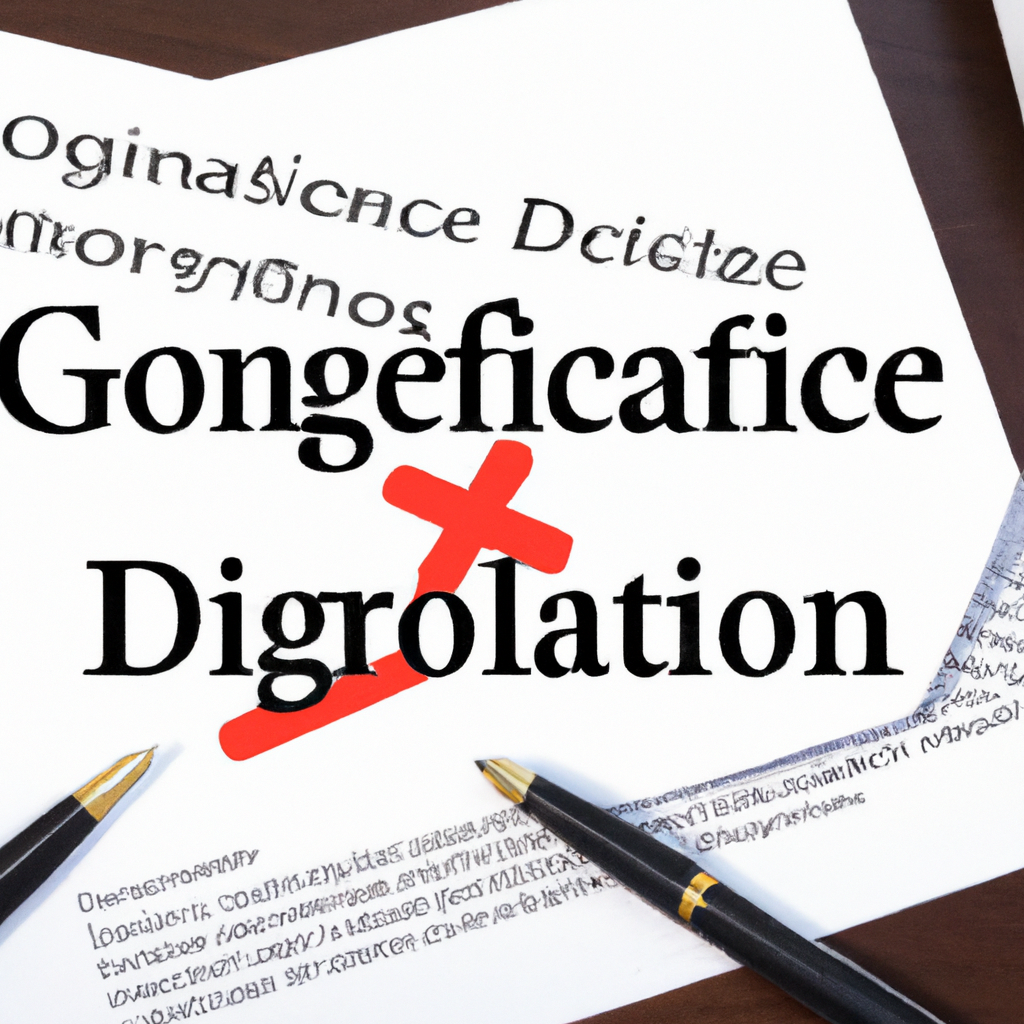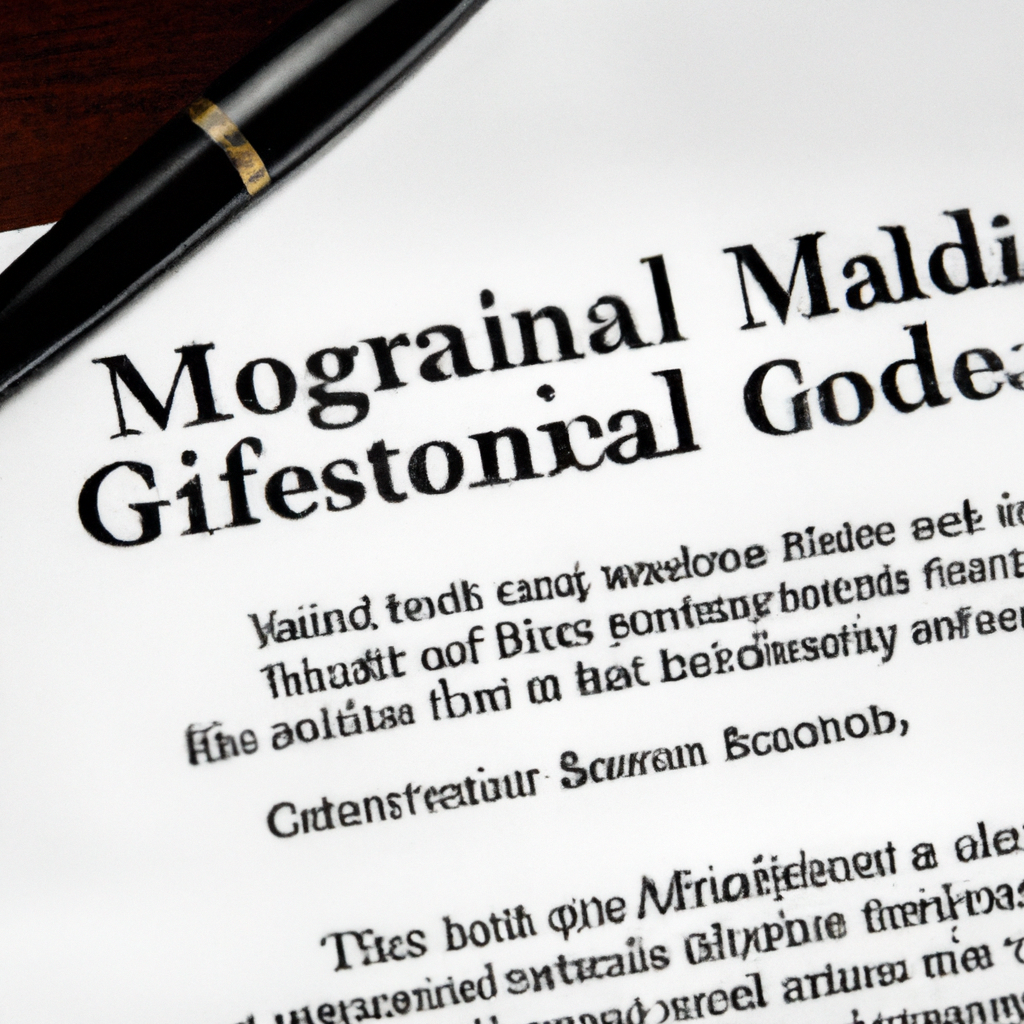Breaking free from the chains of a failing marriage can be a daunting process, filled with uncertainty and emotional turmoil. As couples in Georgia find themselves caught in the web of divorce, one question lingers in their minds: is mediation mandatory? Seeking clarity amidst the chaos, this article delves into the depths of Georgia’s legal landscape, unraveling the threads that bind couples through mandatory mediation. With an unbiased tone, we embark on a quest for truth, aiming to shed light on whether mediation is an inevitable path towards marital dissolution or a beacon of hope for fractured hearts. Let us navigate the intricate crevices of Georgia’s divorce laws, peering into the intricate tapestry that defines the path to healing for estranged couples.
Table of Contents
- Is mediation mandatory in Georgia divorce?
- Understanding the concept of mediation in Georgia divorce proceedings
- Insights into the benefits of mediation in Georgia divorces
- Exploring the exceptions to mandatory mediation in Georgia divorce cases
- Tips for successful mediation in Georgia divorce proceedings
- Considering alternative dispute resolution methods in Georgia divorces
- Navigating the mediation process in Georgia divorces effectively
- Q&A
- Concluding Remarks

Is mediation mandatory in Georgia divorce?
In the state of Georgia, mediation can play a crucial role in the divorce process, but is it mandatory? Let’s break it down to guide you through the intricacies of divorce law in the Peach State.
Mediation in Georgia Divorce: What You Need to Know
In Georgia, while mediation is not mandatory, it is highly encouraged and often a required step in resolving divorce disputes before proceeding to court. Mediation provides an opportunity for divorcing parties to work together with a neutral third party, a mediator, to reach mutually agreeable resolutions. It aims to avoid lengthy and expensive courtroom battles, allowing couples to have more control over their own outcomes and minimizing the impact on any children involved.
Key points to consider:
- Mediation process: During mediation, the parties meet in a private and confidential setting. The mediator guides discussions and assists in finding common ground on issues such as child custody, support, property division, and more.
- Voluntary participation: While mediation is not legally required, Georgia courts favor parties who make a genuine effort to resolve their disputes peacefully through mediation. Attending a mediation session demonstrates a willingness to cooperate and find compromises.
- Exceptional cases: In certain circumstances, such as instances of domestic violence, mediation may not be appropriate or safe. The court will consider such factors and may waive the mediation requirement to safeguard the wellbeing of the parties involved.
Remember, consulting with an experienced family law attorney is always advisable to navigate the specific requirements and nuances of Georgia divorce laws. Ultimately, the decision to pursue mediation is yours, but embracing this alternative dispute resolution method can often yield more amicable outcomes for all parties involved.

Understanding the concept of mediation in Georgia divorce proceedings
In the realm of Georgia divorce proceedings, mediation plays a pivotal role as a method of resolving conflicts and facilitating agreements outside of a courtroom setting. Understanding this fundamental concept is crucial for divorcing couples seeking an amicable and cooperative resolution to their disputes.
At its core, mediation is a voluntary process wherein a neutral third-party mediator assists both parties in reaching a mutually acceptable agreement. This alternative dispute resolution method encourages open communication, cooperation, and compromise, allowing couples to retain control over the outcome of their divorce. By actively engaging in mediation, individuals can avoid the often lengthy and adversarial court process, saving time, money, and emotional strain.
Key elements to comprehend about mediation in Georgia divorce proceedings:
- Impartial Mediator: A qualified mediator, skilled in conflict resolution techniques, is selected to oversee the process. This impartial third party facilitates communication between the divorcing spouses and guides them towards a fair and equitable resolution.
- Informal Setting: Unlike formal courtrooms, mediation sessions occur in a more relaxed and private environment, encouraging open dialogue in a non-threatening atmosphere.
- Customized Agreements: Mediation allows divorcing couples to tailor their agreements to their unique circumstances, providing personalized solutions that may not be available through a court judgment.
- Confidentiality: Discussions during mediation are strictly confidential, fostering a safe space where sensitive matters can be discussed openly and honestly.
- Voluntary Nature: Participation in mediation is voluntary, meaning both parties must willingly engage in the process to achieve a successful outcome.
By comprehending the role and significance of mediation in the landscape of Georgia divorce proceedings, couples can make informed decisions regarding their divorce process, fostering a cooperative environment that prioritizes effective communication and compromise.

Insights into the benefits of mediation in Georgia divorces
In the realm of Georgia divorces, the utilization of mediation has proven to be a transformative approach, offering countless benefits to couples navigating through the complexities of separation. This alternative dispute resolution method not only saves time and money but also allows individuals to retain a sense of control and amicability throughout the process.
1. Emotional well-being: Mediation prioritizes open communication, ensuring that both parties are heard and understood. This empathetic environment helps couples confront their emotions in a healthier manner and fosters a more positive outlook as they work towards a resolution.
2. Cost-effective: The financial burden of a traditional court divorce can be overwhelming. Mediation, on the other hand, enables couples to avoid significant legal fees by coming to mutually agreeable terms with the guidance of a neutral mediator.

Exploring the exceptions to mandatory mediation in Georgia divorce cases
While mandatory mediation is a widely used tool to help divorcing couples reach agreements outside of the courtroom, Georgia law acknowledges that certain situations may not be suitable for mediation. These exceptions ensure that vulnerable individuals and those facing specific circumstances have their needs and concerns adequately addressed through other legal avenues. Understanding the exceptions to mandatory mediation is crucial for anyone going through a divorce in Georgia, as it can significantly impact the resolution process.
1. Domestic Violence: In cases where there is a history of domestic violence or ongoing abuse, the safety of the victim is paramount. Mediation, which requires direct communication between the parties, may not be appropriate or safe in these situations. Courts recognize the potential for power imbalances and coercive behavior, thus exempting cases involving domestic violence from mandatory mediation to protect the well-being of the affected individuals.
2. Child Abuse or Neglect: When child abuse or neglect allegations are involved, the best interests and safety of the child take precedence. Mediation processes could potentially expose the child to further harm or compromise their welfare by placing them in proximity to an abusive parent. In these cases, alternative measures such as child protective services, evaluations, or supervised visitation may be necessary to ensure the child’s well-being without subjecting them to the risks associated with mandatory mediation.

Tips for successful mediation in Georgia divorce proceedings
When going through a divorce in Georgia, mediation can be an effective way to resolve conflicts and reach mutually agreed-upon solutions. Here are some valuable tips to ensure successful mediation in your divorce proceedings:
- Prepare in advance: Before heading into mediation, it’s crucial to gather all relevant documents and information pertaining to your assets, finances, and child custody arrangements. This will help you present a clear and concise case, increasing the chances of a successful outcome.
- Be respectful and open-minded: Maintaining a respectful and open-minded attitude throughout the mediation process is essential. Divorce mediation is all about finding compromises and common ground, so approach discussions with a willingness to listen to the other party’s perspective.
- Choose the right mediator: Selecting the right mediator for your divorce proceedings is paramount. Look for a mediator who is experienced in family law and has a solid understanding of the Georgia legal system. Their knowledge and expertise will be valuable in guiding both parties towards a fair and mutually beneficial resolution.
Remember, successful mediation in Georgia divorce proceedings requires thorough preparation, respect, and the guidance of a capable mediator. By incorporating these tips and approaching the process with a goal-oriented mindset, you can increase the likelihood of reaching a satisfactory resolution and moving forward with your life.

Considering alternative dispute resolution methods in Georgia divorces
When navigating the challenging terrain of divorce proceedings, it’s important to be aware of the alternative dispute resolution methods available in Georgia. These approaches offer divorcing couples the opportunity to resolve their conflicts outside of the courtroom, promoting a more amicable and efficient resolution.
Mediation: A widely recognized alternative, mediation allows couples to work with a trained mediator who assists in facilitating open communication and negotiation. The mediator helps guide the conversation, ensuring both parties have an equitable say in determining important factors such as child custody, division of assets, and spousal support.
Collaborative Divorce: This method emphasizes cooperation, with each spouse retaining their own attorney but committing not to resort to litigation. A team approach is adopted, where financial specialists, therapists, and child custody experts can be consulted, ensuring a well-rounded resolution that considers the best interests of all involved.

Navigating the mediation process in Georgia divorces effectively
When going through a divorce in Georgia, it is crucial to familiarize yourself with the mediation process to ensure a smoother and more amicable resolution. Mediation offers an alternative to costly and time-consuming court battles, allowing both parties to actively participate in crafting their own settlement agreement. To help you navigate this process effectively, here are some key tips:
Preparation
- Understand the mediation process: Familiarize yourself with the mediation guidelines set by the State of Georgia to comprehend what to expect during the sessions.
- Identify your goals: Before entering mediation, determine your objectives and priorities for the outcome. This will act as a guide while negotiating with your former spouse.
- Gather relevant information: Collect all necessary documents, such as financial records, property valuations, and childcare arrangements to present a comprehensive picture of your current situation.
During Mediation
- Focus on effective communication: Maintain a calm and respectful demeanor, actively listening to the other party’s perspective and expressing your own thoughts clearly.
- Work towards compromise: Remember that mediation is about finding a mutually satisfactory resolution. Be open to compromise and find common ground wherever possible to reach a fair and equitable agreement.
- Consult professionals, if needed: If certain aspects of your divorce require specialized knowledge, such as tax implications or child custody evaluations, consult with relevant professionals during the mediation process to ensure informed decision-making.
By following these guidelines, you can navigate the mediation process in Georgia divorces effectively and increase the chances of reaching a positive outcome that meets the needs of both parties involved.
Q&A
Q: Is mediation mandatory in Georgia divorce proceedings?
A: Unraveling the intricacies of divorce in Georgia? Wondering if mediation is a compulsory step? We’ve got you covered. Let’s explore this topic together.
Q: What exactly is mediation in the context of divorce?
A: Mediation is a voluntary process where divorcing couples work with a neutral third party, known as a mediator, to resolve various issues related to their separation. This can include child custody and visitation arrangements, division of property, and determination of financial support.
Q: Is mediation a mandatory requirement for divorces in Georgia?
A: Yes, in most cases. As of publication, Georgia law requires that all parties involved in a divorce attempt mediation before proceeding to litigation. However, exceptions may exist for cases involving domestic violence or situations where immediate action is necessary to protect the well-being of individuals involved.
Q: Why is mediation encouraged in Georgia divorces?
A: The state of Georgia promotes mediation as an alternative dispute resolution method for divorcing couples due to its potential to foster open communication, reduce conflict, and facilitate mutually agreeable outcomes. By encouraging mediation, Georgia aims to alleviate the burden on family courts and enable parties to have more control over the final decisions affecting their lives.
Q: How does the mediation process work in Georgia?
A: Typically, the mediation process begins with both parties meeting the mediator, who guides them through a series of sessions. The mediator acts as a neutral facilitator, helping the couple identify issues, explore potential solutions, and promote constructive dialogue. If an agreement is reached in mediation, it is then presented to the court for approval.
Q: Are there any fees associated with mediation in Georgia?
A: Mediation fees in Georgia vary depending on the mediator and the complexity of the case. The costs are generally split between the divorcing parties, unless otherwise agreed upon. However, individuals facing financial hardships may be eligible for reduced or no-cost mediation services provided by certain organizations.
Q: What happens if mediation fails to resolve all issues?
A: In cases where mediation fails to produce a mutually acceptable resolution for all parties involved, the remaining unresolved issues may proceed to court. A judge will then make final decisions regarding those matters, taking into consideration any agreements reached during mediation.
Q: Can attorneys participate in mediation sessions?
A: Absolutely. Attorneys can play an important role in the mediation process, offering legal advice and guidance to their clients. However, the level of attorney involvement depends on the preferences of the divorcing couple and the guidelines established by the mediator.
Q: Are the outcomes of mediated agreements legally binding in Georgia?
A: Yes, once a mediated agreement is approved by the court, it becomes legally binding and enforceable. It is crucial to ensure that any agreement reached through mediation is fair, equitable, and abides by Georgia’s legal requirements to protect the rights and interests of all parties involved.
Q: Do couples have the option to bypass mediation in Georgia?
A: While mediation is typically mandatory in Georgia divorces, individuals can request an exemption from this requirement under special circumstances. However, such requests are generally subject to court approval and must demonstrate compelling reasons warranting an exception.
Remember, legal matters can be complex, so consulting with an experienced attorney is always advisable to navigate the specific requirements and regulations related to your personal situation.
Future Outlook
As we come to the end of our exploration into the mandatory mediation in Georgia divorce cases, it becomes clear that the state’s commitment to fostering amicable resolutions is both progressive and forward-thinking. The heart of mediation lies in its ability to transform conflicts into opportunities for growth, understanding, and compromise. By mandating mediation, Georgia’s legal system encourages divorcing couples to strive for constructive dialogue and ultimately find peaceful resolutions.
It is important to remember that while mediation is mandatory, it does not mean that every divorce case will have the same outcome. Each couple’s circumstances are as unique as their love story, and there is no one-size-fits-all solution to divorce. Mediation provides a platform for open communication and encourages couples to address their concerns, interests, and needs. Through this process, divorcing partners can reach agreements that not only benefit themselves but also prioritize the well-being and best interests of any children involved.
The beauty of mandatory mediation in Georgia is that it saves invaluable resources, both in terms of time and money. With the load on family courts lightened, couples have the opportunity to tailor resolutions that best suit their particular situation, without relying solely on the judgment of a judge. This allows for greater autonomy and control over the outcome, fostering a sense of empowerment throughout the divorce process.
Although mediation may not be appropriate in every circumstance, its inclusion as a mandatory step in Georgia divorce proceedings sets a remarkable precedent. It encourages individuals to explore alternatives to traditional litigation, reminding us all that divorce does not have to be a battle, but rather an opportunity for growth and cooperation.
In conclusion, mandatory mediation in Georgia divorce cases embodies the state’s commitment to promoting understanding and harmony during a difficult life transition. It is a powerful tool that seeks to empower couples to take control of their future, fostering a sense of collaboration rather than conflict. By embracing mediation, Georgians traverse the path of divorce with resilience and grace, paving the way for a new beginning – one that embodies the spirit of compromise, compassion, and a shared commitment to the well-being of all parties involved.

